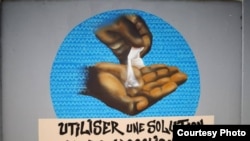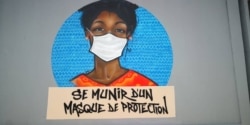In response to the growing coronavirus outbreak in Senegal, where as of early Wednesday morning the number of confirmed COVID-19 cases had climbed to 175, the government has closed the country’s airspace and shut down restaurants, schools and even mosques. The president declared a state of emergency this week, imposing travel restrictions and a curfew of 8 p.m.
But many people are not following recommendations to remain 2 meters apart and to wash hands regularly. In a country where only half the population is literate, how can people get the message out?
To spread awareness, some people are getting creative.
Alpha Sy (pronounced al-fa cee) is an art student and a member of Senegalese graffiti artist collective, RBS, or Radikl Bomb Shot. The group of about 30 artists has been creating murals around Dakar to illustrate proper hygiene practices and to encourage people to stay home and respect the curfew.
Sy said he wasn't panicking but was really scared for everyone, because many members of the public don't realize what’s going on. He said people think the virus is only prevalent in Europe and that it won’t spread to Senegal. He said he didn't think hospitals could handle a caseload of, say, 10,000 people.
Considering Senegal’s low literacy rate, Sy said, art is an effective way to share an important message.
He said his group created the murals for everyone. They wanted people to understand the message, so they decided to focus more on the picture rather than the writing. That way, if people can’t read the writing, at least they can read the image.
The graffiti collective was formed in 2012 to respond to social issues in a manner that would be accessible to youth. Past projects have focused on violence against women and portraits of significant African leaders such as Nelson Mandela.
The first of the COVID-19 murals was done in partnership with Dakar’s Cheikh Anta Diop University, on the school’s campus.
Abdoulaye Sow, a director at the university who commissioned the mural, said the school is an ideal location for the mural because the area gets a lot of foot traffic.
He said people don’t have time to stop for long, so a mural like this allows the message to have the greatest impact.
The graffiti collective has completed three murals thus far. They hope to create about a dozen COVID-related works so that their message can be seen in every neighborhood in Dakar.






